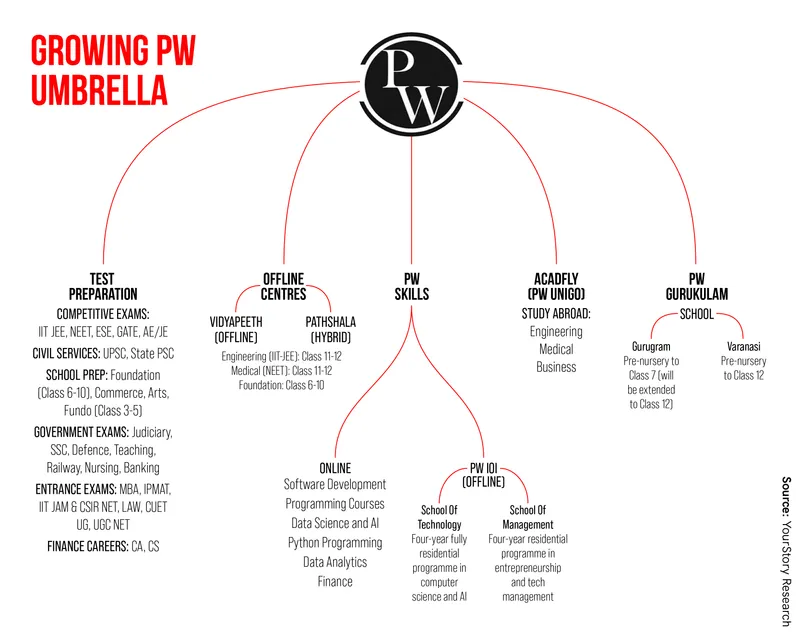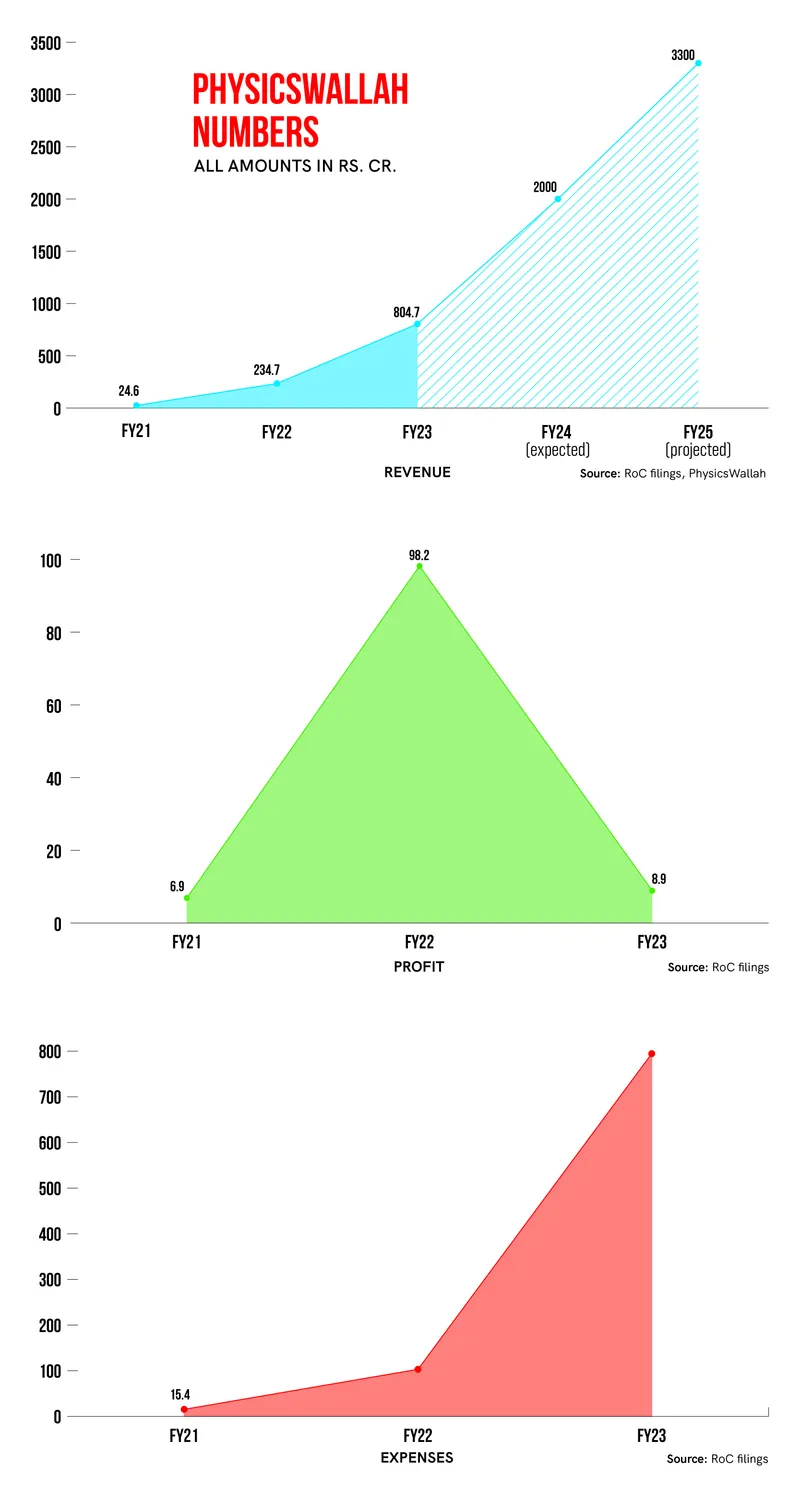With schools, PhysicsWallah wants to “catch ’em young”
At first glance, it may seem counterintuitive for an edtech startup like PhysicsWallah to set up traditional schools, but look closer and the long-term benefits will become apparent.
In the 1980s and 90s, Microsoft realised that if it wanted to become a dominant player in the software industry it must inculcate a lifelong preference for its products among users, and the best way to do it was to “catch ’em young”.
So, it initiated various programmes to provide schools with discounted or donated software, leading many students to use them in their professional and personal lives. And then you know what happened.
(PW), which began life in the test-prep segment and later expanded into the skilling space, is hoping to do something similar with its schools.
At first glance, it may seem odd that an edtech startup that thrives on an asset-light model is moving towards the capital-intensive and old-school (pun intended) way of traditional education.
But look closer and you will find the logic behind the move. By establishing schools, PW is getting closer to its target customer—students—and can influence them at a much earlier stage. It also means a captive revenue source that is not affected by the vagaries of test-prep student rankings.
“Early association with students will give access to a captive audience for its main line of business which is tech-prep,” says Anil Joshi, Managing Partner at Unicorn India Ventures, which has made investments in the edtech space. “Catching students early may be the strategy for PW and there is no harm in leveraging the goodwill that the company has built till date.”
Imran Rashid, Chief Business Officer of PW, agrees that getting into the lifecycle of learners earlier can have a much larger impact, as school is where one “spends 20% of their lifetime” and it “shapes 80%” of what lies ahead.
The Noida-based edtech inaugurated its maiden PW Gurukulam School in Gurugram last month, and is soon expected to launch another one in Varanasi. The Gurugram school, which is affiliated with the Central Board of Secondary Education Board (CBSE), will enrol 400 students in its inaugural batch. The Varanasi school, offering both day scholar and residential options, will admit 300.
“The first time we thought about schools was over a year ago,” says Rashid. Giving further confidence to the edtech company, which was set up in 2020, was the fact that it was already working with over 2,000 schools through its school-integrated programmes.
“It’s very natural for us because we [already] operate in the offline ecosystem, and schools are an integral part of education, primarily offline,” Rashid points out.

Infographic designed by Nihar Apte.
Innovation is key
But even here PW is keen to innovate. Unlike most other “physical” schools that outright buy equipment—tables, chairs and other furniture and machines—the PW-run schools will lease them. This will bring down the capital expenditure and help in producing profits earlier.
Rashid says it typically takes about three years to achieve operational break-even in the school business, but PW aims to do it in two. Rashid claims that a PW school can be operationalised with a budget of $0.5 million (about Rs 4.15 crore). This includes operational expenses for hiring teachers, capability building and marketing promotions.
It’s also innovating in the delivery of education. PW plans to incorporate technology in delivering education to students. This includes teaching during school hours through interactive content delivery, 3D models, and classroom quizzes, among other features.
After school hours, the students will have access to a doubt-solving engine to clear their doubts. PW is also building a web and mobile platform specifically designed for school students.
Bottomline feels the pinch
However innovative, schools—and other investments—need a lot more money and effort to scale and it’s bound to affect the profits at least in the short term. Such heavy expenditure led to PW’s profits falling steeply in fiscal year 2023.
While the startup’s revenue from operations rose more than three-fold during FY23, its profits shrunk 91% to Rs 8.9 crore from Rs 98.2 crore a year ago.
“Though the company has lower profits compared to the previous year, this may be temporary as PW is building the capacity,” says Unicorn India Ventures’ Joshi.
The drop in PW’s profit was driven by a 670.6% rise in expenses to Rs 794.5 crore in FY23. The largest contributor to the firm’s expenses was employee benefits, accounting for 52%. These expenses rose a whopping 877.4% to Rs 413.9 crore.
“It’s like running multiple companies within one company, which is why PW’s personnel costs are high. PW needs to hire the right people to drive the business and scale it across segments,” says a senior edtech industry leader, who preferred not to be named.
However, the founder of a large rival edtech company, who did not wish to be identified, says it’s okay to take a short-term hit for long-term growth. “It’s okay to even go into the red. PW is opening up new lines of businesses, and those businesses, obviously, in the first three years, will lose money,” says the founder. “As a consequence, if you lost money, so what? Also, PW has grown 3X in one year, it’s a very commendable growth.”
However, as the network of schools expands, it will add to the expenses on PW’s profit and loss (P&L) statement, and hurt its bottomline.

Infographic designed by Nihar Apte.
What these schools will give PW though is a steady flow of income, as a student typically enrols at the nursery level and remains for 14 years, says Rashid. This means there is greater predictability, with reduced pressure on admissions each year.
While test prep tends to be very transactional, managing schools involves end-to-end operations and a broader array of responsibilities, he adds.
Adapt or die
Joshi explains that education is an ever-evolving segment that needs to continuously align with the market’s demands, emphasising that those who can adapt to the changing needs of students will have a competitive advantage.
“Initially, (PW) may face the challenge due to the new entrant tag but should be able to overcome it, considering the demand-supply gap for good schools in the market,” Joshi says.
The edtech industry leader quoted above says that PW Co-founder Alakh Pandey’s reputation will help. “He’s got a good reputation in the market, especially in the test prep segment, and everyone holds him (Alakh) in high esteem.”
For PW though, integration will be key. “If we connect schools with test-prep and skilling, then we will solve the purpose of becoming their lifelong learning partner,” says Rashid.
The edtech founder, quoted above, says, PW wants to expand its Total Addressable Market by venturing into new areas like schools.
“Perhaps the first one or two years will be challenging, but one can figure it out. It’s not rocket science,” the edtech founder says. “I’m intrigued by the experiment.”
(Cover image designed by Sharath Ravishankar; infographics designed by Nihar Apte.)
Edited by Jarshad NK








